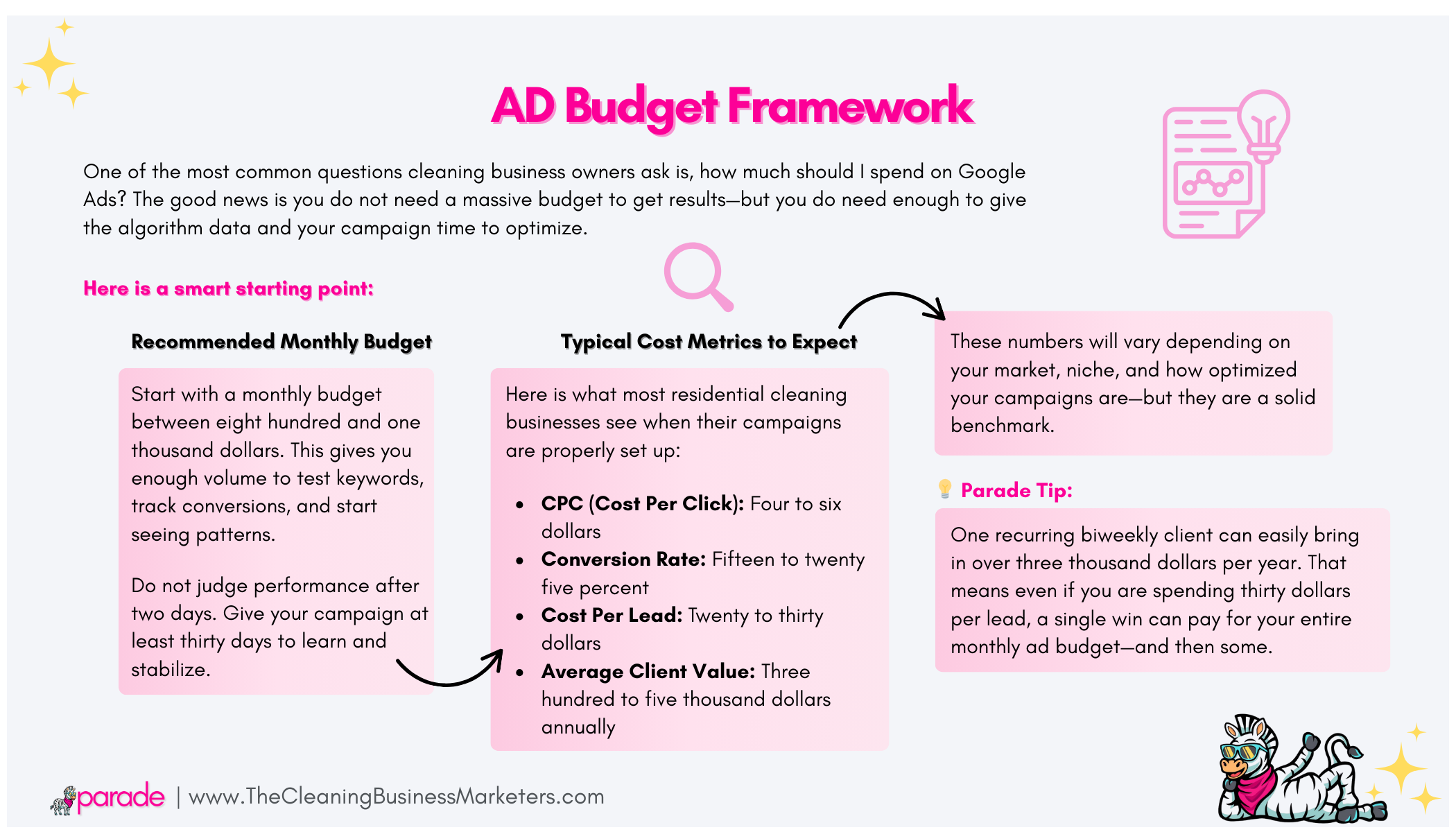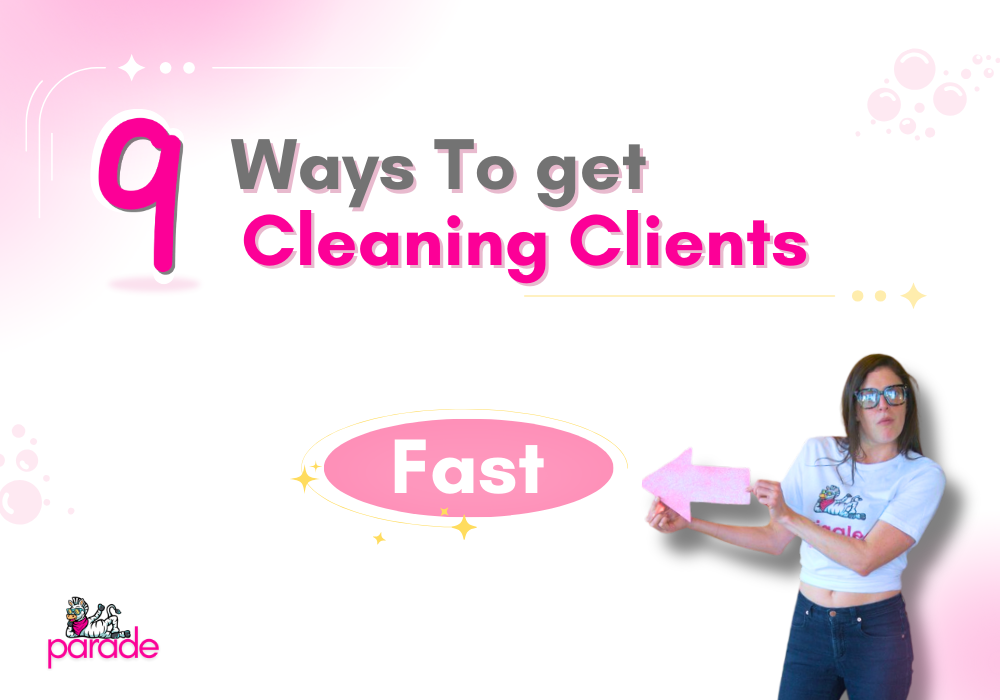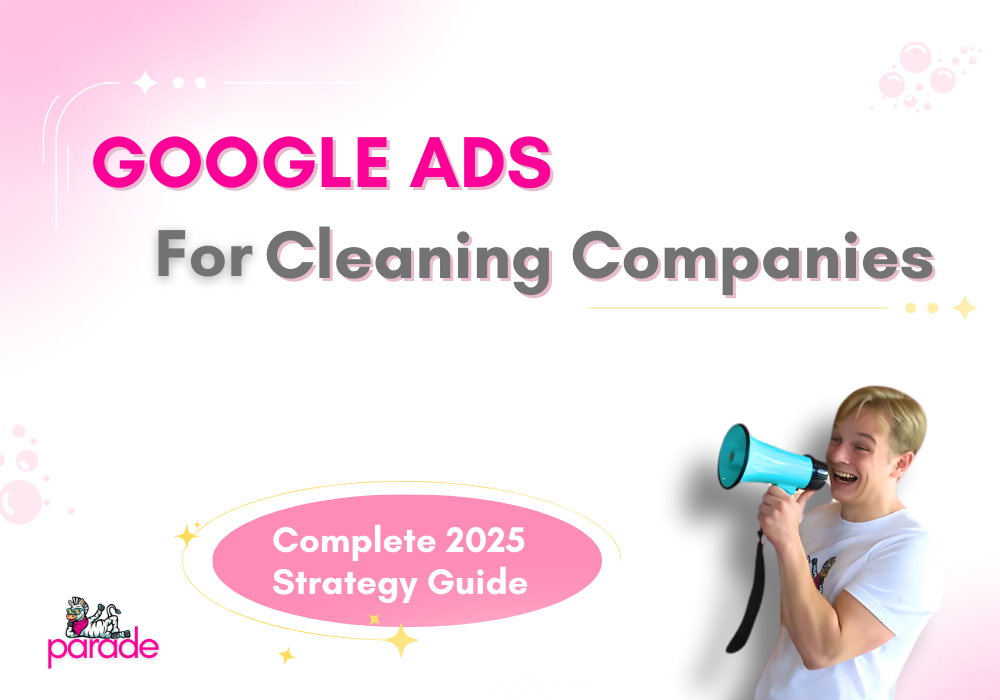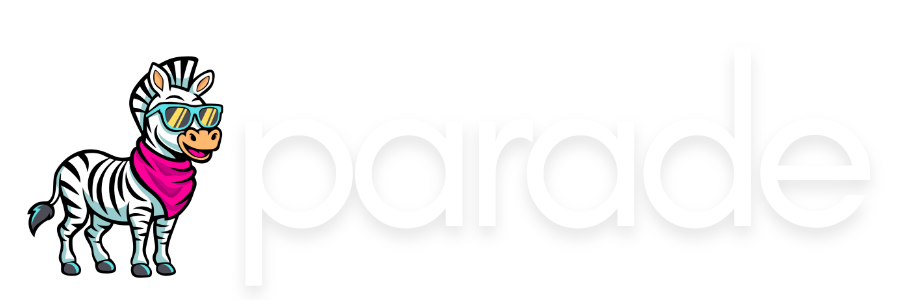The Complete Google Ads Series for Residential Cleaning Companies
Not sure how much to spend on Google Ads?
This blog covers what a realistic monthly budget looks like, what typical results cost, how much to pay an ad manager, when to hire vs DIY, and how to optimize your ad spend for better leads.

Ad Budget Framework
One of the most common questions cleaning business owners ask is, how much should I spend on Google Ads? The good news is you do not need a massive budget to get results, but you do need enough to give the algorithm data and your campaign time to optimize.
Recommended Monthly Budget
Start with a monthly budget between $800 - $1000. This gives you enough volume to test keywords, track conversions, and start seeing patterns. Do not judge performance after two days. Give your campaign at least thirty days to learn and stabilize.
Typical Cost Metrics to Expect
Here is what most residential cleaning businesses see when their campaigns are properly set up:
💰 CPC (Cost Per Click): Four to six dollars
💰 Conversion Rate: Fifteen to twenty five percent
💰 Cost Per Lead: Twenty to thirty dollars
💰 Average Client Value: Three hundred to five thousand dollars annually
These numbers will vary depending on your market, niche, and how optimized your campaigns are—but they are a solid benchmark.
💡🦓💡 One recurring biweekly client can easily bring in over three thousand dollars per year. That means even if you are spending thirty dollars per lead, a single win can pay for your entire monthly ad budget—and then some.
Startup Budget Expectations
In most U.S. markets, start with eight hundred to one thousand dollars per month in ad spend. This gives Google enough data to learn what’s working and who your ideal client is.
Why it matters:
💰 Google needs volume to optimize. If your budget is too low, your campaign may never get enough traction to improve, no matter how good your ad copy or keywords are.
How Much to Pay an Ads Manager or Agency
There is no one-size-fits-all answer here. It depends on your goals, budget, and how much you want to stay hands-on.
💰 DIY or in-house: Zero dollars, just your time
💰 Freelancer or consultant: Four hundred to eight hundred dollars per month
💰 Specialized agency (like Parade): Eight hundred to fifteen hundred dollars per month
Often includes landing pages, conversion tracking, and call tracking setup
What to look for:
💰 Experience with cleaning companies or other local service businesses
💰 Transparent reporting and a clear explanation of what’s working
💰 Conversion tracking fully set up and tested
💰 Actual deliverables, not just “we optimized it”
When to DIY vs Hire It Out
DIY if:
🎓 You are under two hundred fifty thousand dollars in annual revenue
🎓 You have more time than money
🎓 You want to learn Google Ads for the long term
Hire it out if:
🏆 You are past two hundred fifty thousand and ready to scale
🏆 You are expanding into new cities or service types
🏆 You are losing leads due to poor follow-up or unclear tracking
Hiring the right team can save you thousands in wasted ad spend and months of trial and error.
Budget Optimization Tips
These small moves make a big impact on your ROI:
💰 Use phrase match and exact match to keep your traffic relevant
💰 Check your Search Terms report weekly to add negative keywords
💰 Track Cost Per Lead instead of just clicks
💰 Once you have fifteen or more conversions in thirty days, switch to Maximize Conversions bidding
💰 Use location exclusions to block low-value areas and avoid junk leads
💡🦓💡 Your ad budget should grow with your business. Start lean, track every lead, and reinvest in what works. One recurring client can easily cover your ad spend, and then some.
Lead Handling System
Leads from Google Ads is just the beginning. The next steps determine if you convert interest into appointments or lose out to competitors. A robust lead handling system builds trust, increases conversions, and keeps your schedule full.
Response Time Expectations for Cleaning Leads
Speed is everything. Aim to respond within fifteen to thirty minutes. Every minute that passes increases the chance that the lead contacts someone else. Why it matters:
📥 People often reach out to multiple companies
📥 Fast replies create instant trust
📥 You stay top of mind while others are still checking their email
CRM Integration and Lead Scoring
Using a customer relationship management system is a smart move. It helps you:
📥 Track which leads came from Google Ads
📥 Organize leads by service type such as move-out or deep clean
📥 Assign urgency so your team knows who needs a response right away
📥 Keep notes, call logs, and booking details in one place
Follow-Up Sequences for Different Lead Types
Not all leads are equal. Your follow-up system should reflect that.
📥 Hot leads like people who call or request urgent booking should get a phone call and text immediately
📥 Warm leads who fill out a form should get an automated email and follow-up text
📥 Cold leads or people who do not respond should be added to a nurturing email series
Use templates to save time, and add a personal touch when possible.
Converting Leads to Booked Appointments
The goal of every follow-up is simple. Get them booked. To do that:
📥 Ask about their needs right away
📥 Reassure them with clear service options and pricing
📥 Offer your next available time slot
📥 Make it easy to confirm with just a reply or quick call
Confidence makes it easier for people to say yes.
Handling Objections and Pricing Questions
You will get questions. That is good. It means they are interested. Be ready for common ones like:
📥 That sounds expensive
📥 Do I have to be home
📥 Can I book just one area
Have honest, friendly answers prepared. For example:
📥 Our cleaners are full-time professionals and every clean is backed by a satisfaction guarantee
📥 Most clients are not home. We can use a lockbox or code, whatever works for you
📥 Yes. We offer a custom time-based service where you tell us what to prioritize
Lead Nurturing for People Who Are Not Ready to Book
Not every lead will be ready to schedule today. That is okay. Nurture them over time with:
🐢 Email sequences that share tips and common questions
🐢 Success stories from past clients
🐢 Gentle reminders and seasonal offers
🐢 Clear links to your booking form when they are ready
🐢 Stay in touch without pressure. When the time is right, they will book with you.
💡🦓💡 Your lead handling process should feel just like your service. Quick. Friendly. Reliable. If you treat your leads like clients from the first message, they are much more likely to become one.
Quality Score Optimization
Quality Score is one of Google Ads’ most important, and most misunderstood, metrics. For cleaning businesses, getting this right can mean the difference between paying five dollars or fifteen dollars per click for the same lead. Here's how to boost your Quality Score:
What Quality Score Actually Measures
Google assigns a Quality Score from one to ten to every keyword in your account. It is based on three things:
- Expected Click-Through Rate (CTR)
How likely your ad is to be clicked compared to others for that keyword - Ad Relevance
How well your ad copy matches the search intent of the keyword - Landing Page Experience
How useful, relevant, and user-friendly your landing page is
💡🦓💡 A higher score means Google trusts your ad to deliver a good experience. That trust lowers your cost per click and boosts your ad position.
Why Quality Score Matters for Cleaning Companies
You are likely competing with franchises, referral networks, and national chains. Many of them have huge budgets.
Your secret weapon? Quality. A high Quality Score helps you:
🏅 Outrank bigger companies with smaller budgets
🏅 Lower your average cost per lead
🏅 Get better placement without increasing your bid
Quick Wins to Boost Scores
Here are easy improvements you can make this week:
🏅 Use exact match headlines that include your keywords
Example: If you are targeting “Seattle move-out cleaning,” write an ad with that exact phrase in the headline
🏅 Group similar keywords together in small, focused ad groups
Example: Keep all move-out-related terms in one ad group and all recurring cleaning terms in another
🏅 Make sure your landing page headline matches your ad copy
If your ad offers fifty dollars off move-out cleans, your landing page should say that too—above the fold
🏅 Include relevant ad extensions like sitelinks, callouts, and your service area
Long-Term Quality Score Improvement Strategies
For better scores over time:
🏅 Optimize your landing page speed and mobile experience
🏅 Add new variations of ad copy every month to keep content fresh
🏅 Test different CTAs and headline formats to raise your click-through rate
🏅 Track and improve conversion rate (it helps your CTR indirectly)
🏅 Audit your keyword to ad copy to landing page alignment every quarter
This is not a one-time task. It is an ongoing system of small, consistent improvements.
Impact on Ad Costs and Performance
Here is why Quality Score is a big deal for your bottom line:
🏅 A score of 8 or 9 can lower your cost per click by 30 percent or more
🏅 A score of 5 or below means you are paying a premium just to appear
🏅 Higher scores mean more impressions, better ad rank, and cheaper leads
🏅 Even improving your score from 6 to 8 can make a huge difference over the course of a month or year.
💡🦓💡 Most cleaning companies never look at their Quality Scores. That is your advantage. Run a quick audit every month and focus on small wins. It is one of the fastest ways to lower your lead costs without spending a penny more.



.png)
.png)



